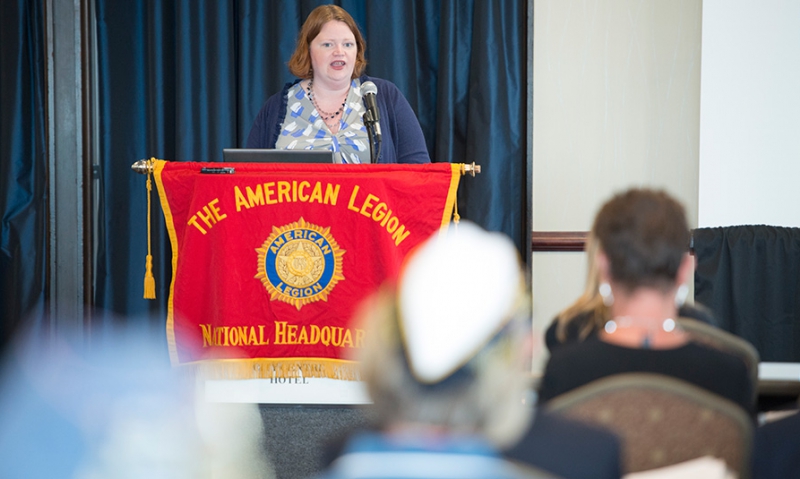
Oratorical Contest: Increase post-level participation
Before speaking at The American Legion’s National Oratorical Conference on Sept. 26 in Indianapolis, Samantha O’Conner reached out to Indiana speech and debate coaches for insight on how many participate in the Oratorical Contest at the post level. Those who responded to the Indiana High School Forensic Association executive director either confused the competition with others in the area or had never heard of the contest.
“That’s a little alarming because I think your speech contest has a set of benefits that others don’t," said O’Conner, who participated in the Oratorical Contest during her senior year in high school. "You’re building citizenship, you’re teaching Constitutional knowledge, and you’re allowing (students) to do an impromptu speech that the others don’t include,. It’s all very meaningful. So it’s really important as you’re recruiting that you’re focusing on those benefits.”
In addition to highlighting what sets the Legion’s program apart from all others, O’Conner named three other areas Legionnaires should address when recruiting program participation at the post level: scheduling, branding and promoting.
The post-level Oratorical Contest will oftentimes coincide with other events that speech and debate students are participating in. Therefore, O’Conner stressed to get contest information out as early as possible and send frequent reminders. “The more times you remind high school coaches and students about your program dates, the more likely you are going to get them to participate,” she said.
For branding purposes, O’Conner heard about a post hosting its Oratorical event at a VA hospital, which “ties the competition back to veterans, making it more memorable not only for that student, but the coach as well,” she said. “You have to have something that makes you unique, that makes you different for coaches and students to not confuse your contest with others.”
Another way to set the Oratorical Contest apart from others is by “making appearances and setting yourself up as an organization who cares,” O’Conner said. For example, one of O’Conner’s speech and debate students won a post-level Oratorical Contest and the following year, when the program was gearing up again, the post members came to the student’s high school and presented her with an award in front of her peers, speech coaches and principal.
“It was a good way to remind us early in the year that (the Oratorical Contest) was something we should do,” O’Conner said. “It also made other students ask how they can get involved in the contest, and it built relationships because I was putting the names with faces of those Legionnaires together again, other than just inside the post on the day of the competition.”
For promotional efforts, O’Conner advised conference attendees to send notifications beyond high school principals or guidance counselors by locating the teacher directory on school websites. “The more you reach out to history teachers, speech and debate teachers and English teachers, the more likely you will get a response,” she said.
Cherian Koshy, director of development at the National Speech and Debate Association, reiterated O’Conner’s sentiments during his conference presentation that “reinforcement of the value of this contest is the most important thing that needs to be accomplished in order for recruitment to occur.”
Since starting a relationship five years ago with The American Legion, the National Speech and Debate Association has been assisting the Legion with promotional efforts to grow participation in the Oratorical Contest. The nonprofit organization has been delivering the value of the program and how to get involved to its 3,000 affiliated high schools through email, social media and advertising in its magazine.
“We are very proud to be partners with The American Legion, and we believe the relationship has been successful as we have seen growth at the post, district and department level in the number of Oratorical program participants,” Koshy said.
Koshy shared that Legionnaires can also promote the program for participation growth by being a judge for their local high school debate tournaments. At his alma mater in Apple Valley, Minn., members of Legion Post 1776 serve yearly as judges during speech and debate tournaments, and speak at the awards ceremony about the Legion’s contest.
“This is a great opportunity for you to be in a space where students are, where teachers are in one setting as opposed to making phone calls to people you don’t know,” Koshy said. “Building that relationship gives you the opportunity to create the reason why they would participate in your contest and show up at your post.”
